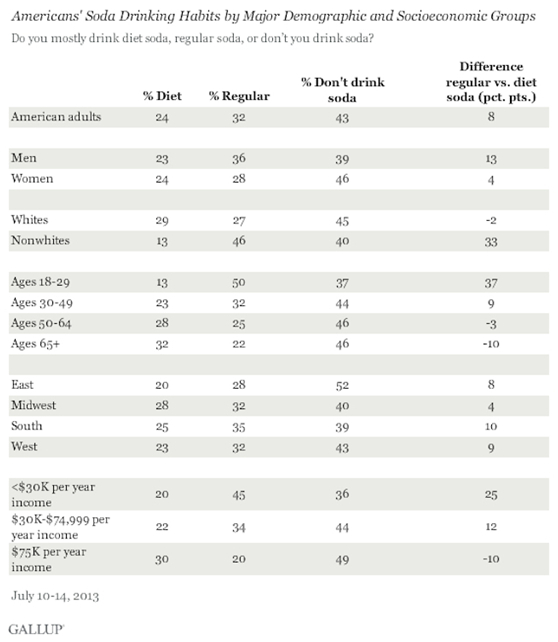President Obama's Home State Seeks To Make Tax Code More Regressive
2017.02.15
When a national soda and snack food tax went into effect in Mexico last month, it gave hope to those looking to revive efforts to impose such levies north of the Rio Grande. While there have been repeated attempts in recent years to pass punitive soft drink taxes in the U.S. at the national, state, and local levels; all of those efforts thus far have been rejected, even in liberal and Democratic bastions like California, Vermont, Philadelphia & Baltimore. This year, the country’s 5th most populous state, Illinois, is the top target for soda tax advocates.
Don't Tell Joe Biden, But Not Only Does The GOP Still Exist, It Governs Most Of The Country
Patrick Gleason
Contributor
States Continue to Chip Away At Income Taxes In 2014
Patrick Gleason
Contributor
For A Model Of Inequality, Look To Democratic Governors
Patrick Gleason
Contributor
State And Local Officials Seek To Increase The Cost Of Travel
Patrick Gleason
Contributor
Illinois State Senator Mattie Hunter (D-Chicago) used Valentine’s Day to launch her campaign to make the Land of Lincoln a little less sweet, introducing legislation two weeks ago that would impose a state excise tax of a penny per ounce on soda, which works out to $3 per case and 67 cents per two liter. The proposed soda tax, if passed, is projected to siphon an additional $600 million a year from the Illinois economy. What’s odd is that while Illinois & national Democrats have been busy ranting about income inequality for months, they then propose and support policies like Sen. Hunter’s soda tax, which would be disproportionately borne by low income households and only serve to increase income inequality.
Illinois taxpayers already face the nation’s 11th highest average state and local tax burden. And the soda tax pending at the state capitol would disproportionately increase this already high burden for middle and low income households. While proponents sell soda taxes under the auspices of improving health and reducing obesity, there is a large body of research demonstrating that soda and other taxes on foods deemed unhealthy have little to no impact on obesity rates.
A 2010 study by Yale University economist Jason M. Fletcher found that taxes on sugary drinks don’t reduce caloric intake among adolescents, and that while soda consumption went down in response to higher taxes, those calories were merely supplanted by increased consumption of other drinks and snacks.
The non-partisan Tax Foundation put out a report on soda taxes in 2011 that summarizes the other academic research on the link, or lack thereof, between soda taxes and obesity. Tax Foundation economist Scott Drenkard concluded that “singling out soda and candy for taxation is a poor method of combatting obesity.”
“Proponents of obesity taxation argue that they are helping to internalize externalities,” adds Drenkard, “yet what they really do is unfairly burden all who enjoy soda and candy, regardless of what might be otherwise very healthy lifestyle habits.”
“Targeting an industry and its consumers does not make for sound public policy,” says the Illinois Policy Institute’s Matt Lucci; adding that “neither does the fact that the tax would fall disproportionately upon minorities and the poor. The reverse-Robin Hood nature of the legislation should be indicated.”
Not only would a state soda tax hit middle and low income households hardest, it would do the most harm to minority households and communities. The chart below outlines the results of a July 2013 Gallup poll, which found greater soda consumption among non-whites than whites:

As misguided as a soda excise tax would be, it is consistent with Illinois’ approach to fiscal policy, which entails forcing individuals, families, and small businesses to face the full brunt of the state’s misguided tax regime, while exempting and providing special treatment to large corporations. As was mentioned in this space last month, after enacting tax hikes of 66 percent and 23 percent on individuals & companies respectively in 2011, Illinois lawmakers subsequently passed special exemptions for politically connected multi-national corporations that can afford to send expensive lobbyists to Springfield.
Aside from hitting hardest those least able to afford it and likely doing nothing to improve health or reduce obesity, a soda tax is a distraction from the real challenges facing the state, such as its more than $97 billion unfunded pension liability, the nation’s largest, and its uncompetitive tax code. Bills like this Illinois soda tax hike are what lawmakers spend their time on instead of governing, making the state more competitive, and conducive to job creation. For CEOs and site selection managers looking to invest and bring jobs to states that are not hostile to employers and taxpayers, Sen. Hunter’s soda tax bill, especially if it passes, is just the most recent reminder that they can go ahead and cross Illinois off the list.
From:Forbes

















 Visitor Registration
Visitor Registration Booth Application
Booth Application